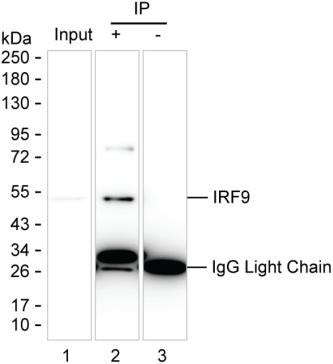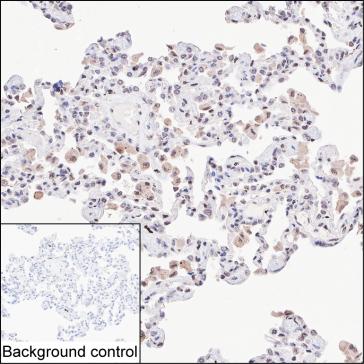

| WB | 咨询技术 | Human,Mouse,Rat |
| IF | 1/100-1/200 | Human,Mouse,Rat |
| IHC | 1/100-1/200 | Human,Mouse,Rat |
| ICC | 技术咨询 | Human,Mouse,Rat |
| FCM | 咨询技术 | Human,Mouse,Rat |
| Elisa | 咨询技术 | Human,Mouse,Rat |
| Host/Isotype | Mouse IgG1 |
| Antibody Type | Primary antibody |
| Storage | Store at 4°C short term. Aliquot and store at -20°C long term. Avoid freeze/thaw cycles. |
| Species Reactivity | Human |
| Immunogen | Purified recombinant fragment of human IRF9 |
| Formulation | Purified antibody in PBS with 0.05% sodium azide |
+ +
以下是关于IRF9抗体的3篇代表性文献,包含文献名称、作者及简要摘要内容:
---
1. **文献名称**: *IRF9 is a key transcriptional regulator of the interferon response in antiviral and inflammatory signaling*
**作者**: T. Tamura, H. Yanai, et al.
**摘要**: 该研究通过使用IRF9特异性抗体进行染色质免疫沉淀(ChIP)和Western blot分析,揭示了IRF9在干扰素信号通路中的核心作用。研究发现IRF9与STAT1/STAT2形成复合物(ISGF3),直接调控干扰素刺激基因(ISG)的表达,并参与抗病毒和炎症反应。
---
2. **文献名称**: *Deficiency of IRF9 leads to dysregulated type I interferon signaling and enhanced susceptibility to viral infection*
**作者**: K. Park, J.E. Durbin
**摘要**: 通过构建IRF9敲除小鼠模型并结合IRF9抗体进行免疫组化分析,作者发现IRF9缺失导致I型干扰素信号通路异常,显著降低宿主对流感病毒的抗性。研究强调了IRF9在先天免疫中的关键调控作用。
---
3. **文献名称**: *IRF9-dependent chemokine expression drives T cell-mediated autoimmunity in lupus*
**作者**: S. Chaussabel, R. Baccala, et al.
**摘要**: 利用IRF9抗体进行流式细胞术和免疫共沉淀实验,研究揭示了IRF9通过调控趋化因子CXCL10的表达,促进T细胞浸润和系统性红斑狼疮(SLE)的病理进展。该发现为自身免疫疾病的靶向治疗提供了新思路。
---
如需具体文献来源或补充更多研究,可进一步说明方向或年份范围。
IRF9 (Interferon Regulatory Factor 9) is a critical transcription factor belonging to the interferon regulatory factor family, which plays a central role in mediating type I and III interferon (IFN) signaling. It forms a heterotrimeric complex, IFN-stimulated gene factor 3 (ISGF3), with phosphorylated STAT1 and STAT2 upon IFN stimulation. This complex translocates to the nucleus and binds to IFN-stimulated response elements (ISREs) in the promoters of interferon-stimulated genes (ISGs), driving the expression of antiviral, immunomodulatory, and antiproliferative proteins. IRF9 is essential for innate immunity, antiviral defense, and tumor suppression.
Antibodies targeting IRF9 are widely used in research to study its expression, localization, and interaction partners. They enable detection via techniques like Western blotting, immunoprecipitation, and immunofluorescence. Such antibodies help elucidate IRF9’s role in diseases, including viral infections (e.g., hepatitis, influenza), autoimmune disorders (e.g., lupus), and cancers, where dysregulated IFN signaling is implicated. Commercial IRF9 antibodies are typically validated for specificity across human, mouse, and rat models, with applications in both basic and translational research. Understanding IRF9 dynamics via these antibodies provides insights into IFN pathway regulation and therapeutic strategies targeting inflammatory or immune-related conditions.
×